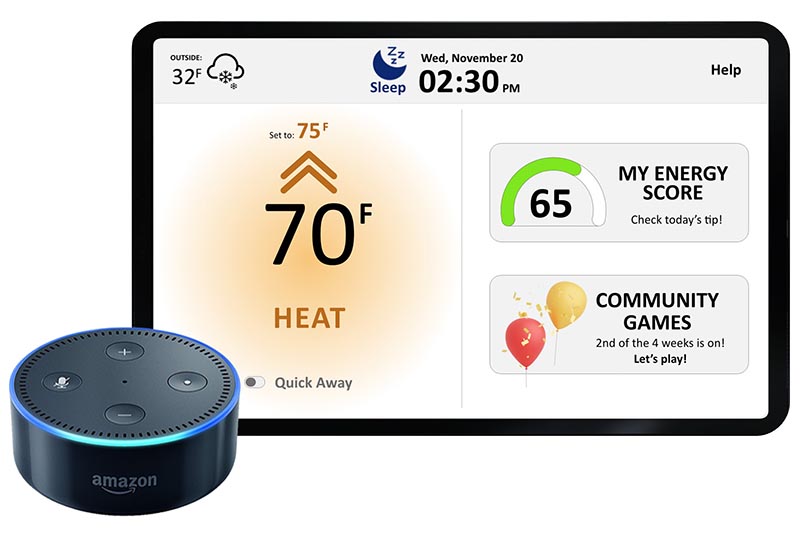
Purdue University researchers have created an IoT software platform called MySmartE that incentivizes people to use energy-efficiency programs developed by government and industry. MySmartE achieved more than 80% residential engagement and 30% energy-use reduction when deployed in more than 130 households across four Indiana cities. (Image provided)
MySmartE strengthens, integrates multiple energy-efficiency programs developed by government, industry
WEST LAFAYETTE, Ind. — State and municipal housing authorities, housing developers, HVAC vendors and utility providers can strengthen their energy-efficiency programs in residential community service areas with a patent-pending, Internet of Things (IoT) system developed by Purdue University researchers that uses gaming to incentivize users.
Panagiota Karava, professor in the Lyles School of Civil Engineering, leads a multidisciplinary research team that has developed MySmartE, an eco-feedback and gaming platform for residential energy management.
"MySmartE addresses the need to effectively deploy energy-efficiency and decarbonization programs in residential communities that would result in measurable, transferable and sustainable outcomes," Karava said. "This is accomplished by actively engaging and incentivizing residents in understanding and reducing their home energy use."
The cloud-based software platform is implemented on user-interactive smart devices. Features include:
- Smart thermostat functionality that works like a smart tablet with a voice assistant.
- Social games that raise awareness of energy-efficient behaviors.
- An algorithm that delivers personalized actionable recommendations.
- Novel energy conservation behavior scores.
Why traditional smart thermostats fail
Karava said the residential sector is responsible for more than 20% of the total energy use and greenhouse gas emissions in the United States. Various programs have been implemented to improve energy efficiency and to reduce energy consumption in individual households. These include building retrofits, which she said are typically costly, and smart devices like smart thermostats.
"A major advantage of implementing smart devices is that they do not require a large investment in communication infrastructure for data collection and system control," Karava said.
Smart thermostats have drawbacks, however. Studies report that they are not often used correctly due to difficulties in usability, and there's a decrease in resident motivation over time.
"One online survey reported that about 40% of programmable-thermostat users did not understand how to program schedules; about 33% maintained a permanent hold mode without using scheduling features," Karava said. "Similarly, my research team's experiments with 94 households in Indianapolis and Fort Wayne show that the majority of households used constant set-point temperatures throughout winter and summer; they didn't utilize any of the thermostats' smart features."
MySmartE testing and validation
The MySmartE web-based software platform uses eco-feedback and social games to engage its users. The platform leverages advances in physics-informed machine learning and human decision-making algorithms.
"Engagement is further accelerated by an intuitive user interface for efficient thermostat control and modularized software infrastructure," Karava said. "The infrastructure is scalable and flexible to support multiple deployments across diverse housing stock, population demographics and energy programs."
MySmartE achieved more than 80% residential engagement and 30% energy-use reduction when deployed in more than 130 households across four Indiana cities: Indianapolis, Fort Wayne, South Bend and New Albany.
"Also, our extensive interviews with residents revealed that gamification in MySmartE turns the energy-saving process into a fun and enjoyable activity while increasing energy awareness," Karava said.
The research team received a $400,000 supplement from the National Science Foundation to further its work; the award builds on an initial $3.5 million award in 2018.
The MySmartE team includes:
- Ilias Bilionis, associate professor of mechanical engineering, College of Engineering.
- James Braun, director, Center for High Performance Buildings; the Herrick Professor of Engineering, School of Mechanical Engineering; professor of civil engineering; courtesy appointment in Environmental and Ecological Engineering, College of Engineering.
- Hemanth Devarapalli, senior research support analyst, Center for High Performance Buildings, School of Mechanical Engineering, College of Engineering.
- Huijeong Kim, visiting assistant professor, Lyles School of Civil Engineering, College of Engineering.
- Thanh Nguyen, the Lewis B. Cullman Rising Star Professor of Management, Mitchell E. Daniels, Jr. School of Business.
- Leigh Raymond, adjunct professor of political science, College of Liberal Arts.
- Julia Rayz, professor and associate head, Computer and Information Technology, Purdue Polytechnic Institute.
- Torsten Reimer, professor of communication, College of Liberal Arts; courtesy appointment in Psychological Sciences, College of Health and Human Sciences.
The team also included Sang woo Ham and Vanessa Kwarteng, former doctoral students in the College of Engineering, and Marlen Promann, former research assistant and postdoctoral fellow in the Center for High Performance Buildings, School of Mechanical Engineering, College of Engineering.
Karava disclosed the MySmartE platform to the Purdue Innovates Office of Technology Commercialization






